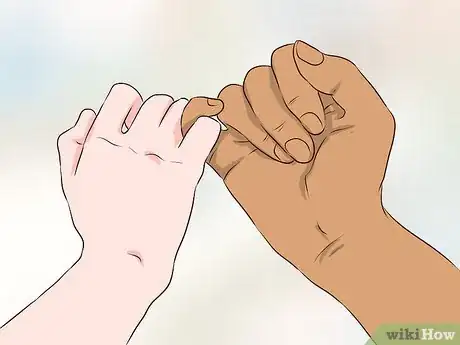This article was co-authored by Moshe Ratson, MFT, PCC and by wikiHow staff writer, Amber Crain. Moshe Ratson is the Executive Director of spiral2grow Marriage & Family Therapy, a coaching and therapy clinic in New York City. Moshe is an International Coach Federation accredited Professional Certified Coach (PCC). He received his MS in Marriage and Family Therapy from Iona College. Moshe is a clinical member of the American Association of Marriage and Family Therapy (AAMFT), and a member of the International Coach Federation (ICF).
There are 13 references cited in this article, which can be found at the bottom of the page.
This article has been viewed 75,642 times.
Trust takes time and effort to build. In order to gain someone’s trust, you will have to earn it one action at a time. By consistently acting in a reliable way, you will show them that you can be trusted and depended on. As long as you repeatedly prove your trustworthiness with your actions, you will gain their trust over time.
Steps
Demonstrating Trustworthiness
-
1Be reliable.[1] Your dependability will initially be tested with small things. Even if these things seem insignificant, they matter when you’re trying to develop trust.[2] For example, always return things that you borrow undamaged.[3] If you say you are going to be somewhere, show up and be on time. When you say you’re going to do something, no matter how small, do it.
- Every time you prove that you’re dependable, trust grows.
- No one is perfect. Occasionally you are going to be late, lose a borrowed book, or forget about something you said you would do. When this happens, apologize and own up to it immediately.
- If you have to break plans that you have made with someone, then make sure to call and let the person know as soon as possible. Try not to do this too often though because it can have a negative effect on your relationship if you are always canceling at the last minute.
-
2Keep their secrets confidential.[4] Prove that you can be trusted by respecting their privacy.[5] Never share any confidential information that they give you. If you do, that person probably won’t feel comfortable trusting you with their secrets again for a long time, if ever. The only time you should consider breaking a confidence is if the person is in some kind of life-threatening danger and you need to alert someone.
- Even then, the person will probably be angry with you for breaking their confidence.
- If this happens, apologize and explain that you only did it because you were truly worried about their safety.
Advertisement -
3Be honest.[6] When someone learns that you've lied to them, they're naturally going to assume it will happen again. Be truthful with them, even when it’s hard. If you think telling them the truth might hurt their feelings, try to find a considerate way to tell them. If you make a mistake, take responsibility and own up to it.[7] Be upfront with them. Don’t let them find out about it some other way.
- Work on showing that you’re an honest person – even if your friend isn’t directly involved in the situation.[8]
- If they witness you being honest about other things and with other people, it will make them feel like you’ll be honest with them, too.
- If you need to be honest with your friend about a difficult topic, try starting off like this, "Jen, I really love how our honest our friendship is, and I want to keep it that way. I need to talk to you about something..."
- You could also bring up the topic like this, "Eric, this is hard to tell you, but I'm your friend and I feel like you should know about this..."
-
4Trust them first. By sharing something personal with your friend, it shows that you feel a sense of trust around them. Relationships are give-and-take situations. Sometimes, in order to receive something, you have to demonstrate that you're willing to give it. By trusting them first, you are showing them it’s safe for them to do the same thing.
- For example, you could ask for their advice about a personal problem you’re experiencing, or go to them for help on a project.
- You could start off by saying, "Danielle, I know I can trust you. I really need to talk to someone I trust about this..."
- You could also say, "Jim, this is kind of embarrassing, but I am failing algebra right now. If my parents knew, I'd be in serious trouble. You're great at algebra, do you think you could help me?"
- You might feel vulnerable at first, but learning to trust someone usually begins by putting yourself out there.[9]
Building a Healthy Relationship
-
1Show kindness, respect, and acceptance.[10] To build trust, it is important to show that you are kind, respectful, and accepting of the other people.[11] Be understanding and show them compassion when they need it. Always respect their thoughts and beliefs, even when they are different from yours.[12]
- If you disagree on something, be respectful about it. For instance, don’t say, “I don’t believe in your religion at all. It sounds really weird.”
- Instead, say something like, “My beliefs are pretty different, but that’s ok! I respect all religions.”
- Also, be accepting of your friend. Don’t try to get your friend to change for you.
-
2Spend time with them. Trust is built over time, so be ready and willing to invest time in someone if you want to gain their trust. Each time you hang out, it’s an opportunity to have positive interactions and show your trustworthiness. Avoid only being around them when things are going well. Be there for them during the ups and the downs.[13]
- Your willingness to be around them when they’re going through a hard time shows them that they matter to you.
- You aren’t hanging around just to have fun and enjoy the good times – you want to have a real friendship.
-
3Be sincere.[14] Meaningless flattery and only telling someone what they want to hear isn’t the same thing as kindness. You don’t want to hurt anyone’s feelings, but you also don’t want to lie to them. Avoid being vague with them. Be specific and really mean the things you say. For example, if your friend asks you how they look in an outfit and it doesn’t look flattering, don’t automatically say, “It looks great!” when you know it doesn't.
- However, you also don’t want to say, “Honestly, you look a bit overweight in that.”
- Instead, you could say something like, “That color looks awesome on you! I like the style of the outfit, but I’m not sure about the neckline. Let’s look for something else in that color.”
-
4Be accessible.[15] When your friend texts or calls you, try to reply or call them back as soon as you can. If they send you a text and you don’t respond for days, it creates the illusion that you either don’t care enough to reply, or you’re busy doing something that you can’t talk to them about. Try to be available when they need you.
- For example, if you’re busy at the library and your friend texts you, send a quick response like, “In study group right now! Will get back to you ASAP.”
- Another example: If you’re on a vacation with your family and you’re going to be busy for days, don’t leave them hanging. Respond with, “Out of town with my family – we’re skiing! Will be back Sunday – I’ll call you.”
-
5Listen without making judgments.[16] When someone tells you a story or expresses a feeling, it is important to listen without making judgments. Make sure that you keep an open mind when you listen to people and do not express judgment for the things they share with you.
- For example, if a friend shares with you that she had a one night stand with someone, don’t tell her that she shouldn’t have done that or try to give her unsolicited advice about what to do. Just listen to her and offer your support if she expresses worry over the situation.
- Avoid thinking about what you are going to say next. Just focus on what the person is saying.[17]
- Pay attention to their facial expressions and body language as well to get insight into how they are feeling.
Showing Loyalty
-
1Avoid gossiping.[18] Never gossip about your friend to other people – most of the time, they are going to find out about it. It’s hard to rebuild trust when someone feels that you’ve betrayed them in this way. You should also avoid gossiping to your friend about other people. When you do this, it plants the idea in their head that you might also gossip about them, too.
- When you gossip with someone, it can sometimes feel like you’re bonding with them because you’re sharing privileged information together.
- However, this is not a healthy way to bond with your friend. Nothing positive ever results from gossiping.
- If you hear other people gossiping about your friend, stand up for them. This will very clearly demonstrate your loyalty.
-
2Keep your promises.[19] Each time you break a promise, trust decreases.[20] Be true to your word and avoid making promises that you can’t keep. If you do break a promise and it’s something minor, be sincerely apologetic and try to make it up to them in some way. The damage is usually minor in this situation. If you break an important promise, however, things are going to be a lot harder to make right.
- Depending on the nature of the broken promise, gaining their trust may no longer be possible.
- The best approach is to avoid making promises that you can’t keep. Always try your best to keep the promises you do make.
-
3Be supportive. Support your friend’s dreams and goals, even when no one else does. Encourage them when they lose hope.[21] Always have their back and show them that you can be counted on to be there for them. When someone knows that you are going to be supportive, they will feel more comfortable sharing things with you.
- For example, "Darrell, I know how much you want to get into film school. I know your parents don't agree, but I think you have what it takes to get in. I got a really nice camera for Christmas, but I honestly don't use it much. I want you to have it..."
- Being supportive doesn’t mean always being in favor of everything they do, especially when it’s harmful or dangerous for them.
- Always try to make it clear that you want the best for them.[22] If you aren’t supportive of something, explain to them why. Be honest with them.
- For instance, in a negative situation, you could say, "Whitney, I'm your best friend and I want the best for you. I would never be unsupportive of any of your choices unless I felt truly worried about you. I honestly feel like your new boyfriend is a bad influence on you..."
- Make sure that you remember important dates as well, such as anniversaries, birthdays, and other special dates in your relationship.
-
4Help them.[23] Be there for them, even when you aren’t asked. If you see a friend struggling, do what you can to help them through it. For instance, if your friend is failing a subject in school, don’t just sit back and watch. Offer to help them with their homework and study with them.
- If you step in to help them with something when the chips are down, without even being asked, they will feel like they can count on you.
Expert Q&A
Did you know you can get expert answers for this article?
Unlock expert answers by supporting wikiHow
-
QuestionHow can I make my friend trust me?
 Moshe Ratson, MFT, PCCMoshe Ratson is the Executive Director of spiral2grow Marriage & Family Therapy, a coaching and therapy clinic in New York City. Moshe is an International Coach Federation accredited Professional Certified Coach (PCC). He received his MS in Marriage and Family Therapy from Iona College. Moshe is a clinical member of the American Association of Marriage and Family Therapy (AAMFT), and a member of the International Coach Federation (ICF).
Moshe Ratson, MFT, PCCMoshe Ratson is the Executive Director of spiral2grow Marriage & Family Therapy, a coaching and therapy clinic in New York City. Moshe is an International Coach Federation accredited Professional Certified Coach (PCC). He received his MS in Marriage and Family Therapy from Iona College. Moshe is a clinical member of the American Association of Marriage and Family Therapy (AAMFT), and a member of the International Coach Federation (ICF).
Professional Therapist
-
QuestionWhat can I say to make someone trust me more?
 Moshe Ratson, MFT, PCCMoshe Ratson is the Executive Director of spiral2grow Marriage & Family Therapy, a coaching and therapy clinic in New York City. Moshe is an International Coach Federation accredited Professional Certified Coach (PCC). He received his MS in Marriage and Family Therapy from Iona College. Moshe is a clinical member of the American Association of Marriage and Family Therapy (AAMFT), and a member of the International Coach Federation (ICF).
Moshe Ratson, MFT, PCCMoshe Ratson is the Executive Director of spiral2grow Marriage & Family Therapy, a coaching and therapy clinic in New York City. Moshe is an International Coach Federation accredited Professional Certified Coach (PCC). He received his MS in Marriage and Family Therapy from Iona College. Moshe is a clinical member of the American Association of Marriage and Family Therapy (AAMFT), and a member of the International Coach Federation (ICF).
Professional Therapist
References
- ↑ http://www.pamf.org/teen/abc/buildingblocks/trust.html
- ↑ Moshe Ratson, MFT, PCC. Marriage & Family Therapist. Expert Interview. 7 August 2019.
- ↑ http://4h.missouri.edu/showmecharacter/trustcc
- ↑ http://www.pamf.org/teen/abc/buildingblocks/trust.html
- ↑ http://www.loveisrespect.org/healthy-relationships/
- ↑ http://4h.missouri.edu/showmecharacter/trustcc
- ↑ http://www.embracepossibility.com/blog/ways-to-build-trust/
- ↑ http://www.beyondintractability.org/essay/trust-building
- ↑ http://www.embracepossibility.com/blog/ways-to-build-trust/
- ↑ http://4h.missouri.edu/showmecharacter/caringcc
- ↑ Moshe Ratson, MFT, PCC. Marriage & Family Therapist. Expert Interview. 7 August 2019.
- ↑ http://kidshealth.org/en/teens/healthy-relationship.html
- ↑ http://tinybuddha.com/blog/25-ways-to-be-a-true-friend/
- ↑ http://www.beyondintractability.org/essay/trust-building
- ↑ http://www.embracepossibility.com/blog/ways-to-build-trust/
- ↑ Moshe Ratson, MFT, PCC. Marriage & Family Therapist. Expert Interview. 7 August 2019.
- ↑ http://psychcentral.com/lib/the-skill-of-mindful-listening/
- ↑ http://4h.missouri.edu/showmecharacter/trustcc
- ↑ http://4h.missouri.edu/showmecharacter/trustcc
- ↑ Moshe Ratson, MFT, PCC. Marriage & Family Therapist. Expert Interview. 7 August 2019.
- ↑ http://www.loveisrespect.org/healthy-relationships/
- ↑ https://www.psychologytoday.com/blog/trust-the-new-workplace-currency/201309/ten-ways-cultivate-work-relationships-and-grow-trust
- ↑ http://ctb.ku.edu/en/table-of-contents/leadership/leadership-functions/build-sustain-relationships/main
About This Article
To gain someone’s trust, show that you’re reliable through actions like keeping your promises and always returning things that you borrow. You can also demonstrate your trustworthiness by keeping other people’s secrets and being honest. Don’t lie or conceal the truth from others, even if telling the truth is scary or painful. Additionally, you can help people feel more trusting of you by showing that you trust them. For example, you might open up to them about something that is private and personal to you. Read on for more advice, including how to build a healthy relationship based on trust.









































































